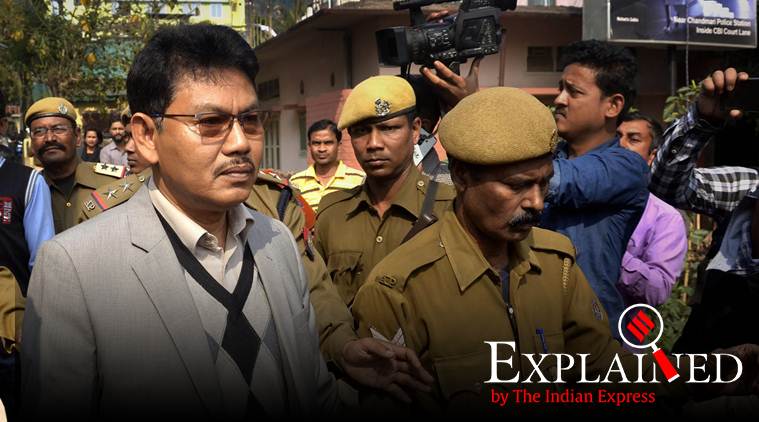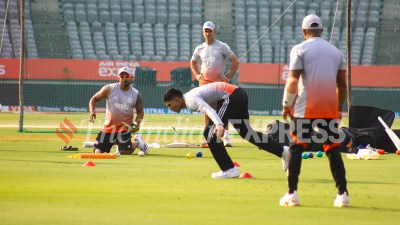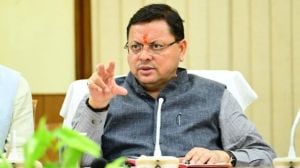Explained: Who is Ranjan Daimary of NDFB and what do the Bodos want?
Indian security forces’ extensive operation against the NDFB in the 1990s led the group to retort to bordering Bhutan, only to face stiff counter-insurgency operations by the Indian Army and the Royal Bhutan Army in the early 2000s.
 National Democratic Front of Bodoland (NDFB) chief Ranjan Daimary, convicted in the 2008 Assam serial bomb blasts case, is taken to the special CBI court to hear the quantum of punishment, in Guwahati, Wednesday, January 30, 2019. (PTI Photo)
National Democratic Front of Bodoland (NDFB) chief Ranjan Daimary, convicted in the 2008 Assam serial bomb blasts case, is taken to the special CBI court to hear the quantum of punishment, in Guwahati, Wednesday, January 30, 2019. (PTI Photo)
National Democratic Front of Bodoland (NDFB) founder Ranjan Daimary and nine others were sentenced to life imprisonment for the 2008 Assam serial blasts case. A Special CBI court in Guwahati pronounced the sentence on Wednesday, two days after it convicted 14 accused in the case. The remaining four have served their sentence and paid fine in the case.
The serial blasts had killed at least 88 people. The others who were sentenced were George Bodo, B Tharai, Raju Sarkar, Anchai Bodo, Indra Brahma, Loko Basumatary, Khargeswar Basumatary, Ajay Basumatary and Rajen Goyary.
Bodoland: The demand for a separate state
Bodos are the single largest tribal community in Assam and constitute over 5-6 per cent of the total state population. The demand for a separate state called Bodoland has resounded in the state since 1967-68 under the banner of the political party Plains Tribals Council of Assam (PTCA).
In 1987, Bodos, under the leadership of the All Bodo Students Union (ABSU), renewed the demand. The ABSU was at that time led by Upendra Nath Brahma, who coined the term ‘divide Assam fifty-fifty’.
Political scientists observe that the demand was a fallout of the six-year-long Assam Movement — a struggle by the Bodos to protect their own identity when the Assam Accord talked about protection and safeguards to the “Assamese people”.
“We want Bodoland”
“Divide Assam 50-50”
Slogans reverberate as NDFB chief Daimary and other members are taken away in a police bus. @IndianExpress pic.twitter.com/wpwenwayar— Abhishek Saha (@saha_abhi1990) January 30, 2019
Ranjan Daimary and the National Democratic Front of Bodoland (NDFB)
Parallel to political movements for a Bodo state, one of the prominent armed groups was Bodo Security Force (BdSF), formed under the leadership of Ranjan Daimary in October 1986. The BdSF soon renamed itself to the National Democratic Front of Bodoland (NDFB), an organisation alleged to be involved in attacks, killings and extortions.
“When our democratic movement failed and the Government of India didn’t even consider us for a union territory or statehood, we thought it would be better to demand a sovereign state and fight for it,” Daimary had told the magazine Fountain Ink in 2016.
Indian security forces’ extensive operation against the NDFB in the 1990s led the group to retort to bordering Bhutan, only to face stiff counter-insurgency operations by the Indian Army and the Royal Bhutan Army in the early 2000s.
Over the years, there were failed attempts of negotiations between the GoI, government of Assam and the NDFB.
2008 Assam serial blast case
In October 2008, as Monday’s conviction by the Special CBI court shows, the group carried out the serial blasts killing nearly 90 people.
Soon after the blasts, the NDFB was divided into two factions — the NDFB(Progressive) and Daimary’s faction NDFB(RD). The Progressive faction started talks with the GoI since 2009. Daimary was arrested and handed over to India by Bangladesh in 2010 and then, granted bail in 2013. As of now, Daimary’s is in peace talks with the GoI.
In 2012, Ingti Kathar Songbijit, broke away from the NDFB(RD) and formed his own faction, NDFB(S). The faction was is said to be behind the massacre of 66 Adivasis in Assam December 2014.
In 2015, Songbijit was removed as the chief of the group and B Saoraigwra took over. This faction of the NDFB is still active while Songbijit — interestingly not a Bodo but a Karbi — is said to have flouted is own Karbi militant group.
- 01
- 02
- 03
- 04
- 05







































